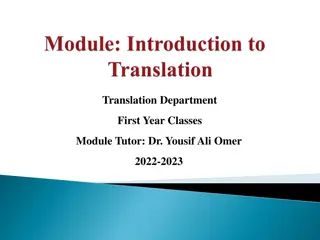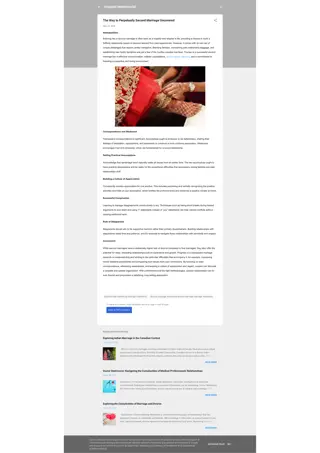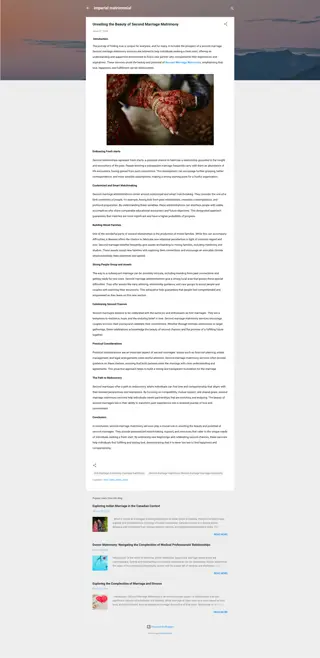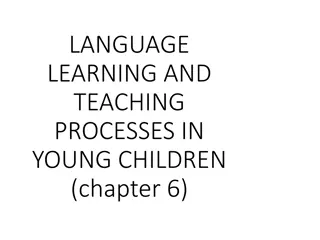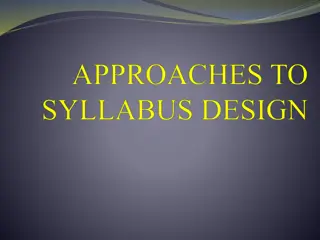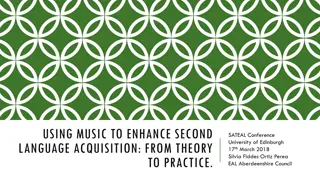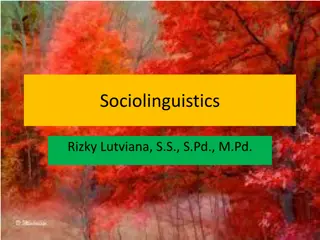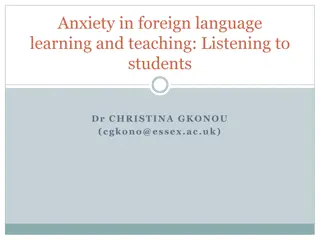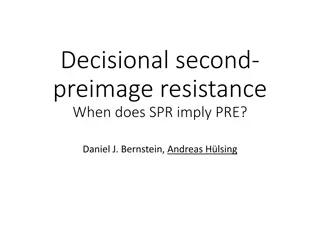Insights into Second Language Learning Research
This presentation delves into various aspects of second language learning research, including the use of dictionaries, part-of-speech explanation, grammatical rules, and bilingual dictionary use. Studies show mixed results on the effectiveness of meta-analysis in form-focused instruction and the impact of explicit feedback, while highlighting the prevalence and preference for bilingual dictionaries among language learners. The content emphasizes the role of dictionaries in expanding active vocabulary and the challenges faced by foreign language learners in utilizing monolingual dictionaries.
Download Presentation

Please find below an Image/Link to download the presentation.
The content on the website is provided AS IS for your information and personal use only. It may not be sold, licensed, or shared on other websites without obtaining consent from the author.If you encounter any issues during the download, it is possible that the publisher has removed the file from their server.
You are allowed to download the files provided on this website for personal or commercial use, subject to the condition that they are used lawfully. All files are the property of their respective owners.
The content on the website is provided AS IS for your information and personal use only. It may not be sold, licensed, or shared on other websites without obtaining consent from the author.
E N D
Presentation Transcript
EAP Practice and Second Language Research Dr Dina Awad
To explain a new word, I mention its part-of-speech 45% 40% 35% 30% 25% 20% 15% 10% 5% 0% Never Rarely Sometimes Frequently Always
L2 Research Meta-analysis in form-focussed instruction does not make a positive difference for classroom second language learning. Norris & Ortega (2000) there is no evidence .. that knowledge about grammar is a useful tool ... to write more fluently and accurately . Andrews (2005)
I mention grammatical rules to explain or correct errors. 60% 50% 40% 30% 20% 10% 0% Never Rarely Sometimes Frequently Always
L2 Research There were no significant differences between the codes and no-codes groups. The less explicit feedback seemed to help students to self-edit just as well as corrections coded by error type . Ferris & Roberts (2001)
I encourage the use of dictionaries in reading tasks 45% 40% 35% 30% 25% 20% 15% 10% 5% 0% Never Rarely Sometimes Frequently Always
Dictionary use per skill RECEPTIVE PRODUCTIVE Reduces deduction and inference obstructs guessing & hypothesis formation Expands active vocabulary Stored in long-term memory
I allow students to use bilingual dictionaries . 45% 40% 35% 30% 25% 20% 15% 10% 5% 0% Never Rarely Sometimes Frequently Always
L2 Research Bilingual dictionary use is inevitable 200 million use Google translate Most students prefer bilingual dictionaries Hamouda (2013), Hanks (2016) there are important respects in which even the best monolingual dictionary cannotassist a foreign language learner Lew & Adamska-Sa aciak (2015)
I encourage students to infer the meaning without dictionaries 45% 40% 35% 30% 25% 20% 15% 10% 5% 0% Never Rarely Sometimes Frequently Always
L2 competence study With Without dictionaries dictionaries Pre-test 48.53% Pre-test 47.45% Post-test 73.76% Post-test 50.44%
I underline grammar mistakes in written assignments 45% 40% 35% 30% 25% 20% 15% 10% 5% 0% Never Rarely Sometimes Frequently Always
Repair Longest lasting effect Self 2nd most effective Peer Marginal Teacher
L2 Research Teachers should consider Correction-free teaching Trustcott (1999)
I encourage students to do extra grammar exercises at home. 50% 45% 40% 35% 30% 25% 20% 15% 10% 5% 0% Never Rarely Sometimes Frequently Always
L2 Research Knowing about language language Knowing language Knowing about Knowing language Meaning Form Meaning Form
L2 Research Knowledge aboutGrammar improves performance . in grammar tests Awareness of grammatical rules helps corrections in process writing Explicit information may not necessarily facilitate second language acquisition Sanz & Morgan-Short (2004)
I encourage students to read stories and listen to radio at home 45% 40% 35% 30% 25% 20% 15% 10% 5% 0% Never Rarely Sometimes Frequently Always
L2 Research Vocabulary is more memorable in meaningful contexts when reader/listener is fully engaged Automated synthesis of information closes the gap between known and unknown items
L2 Research xxxxxxxxxxAxxxxxxxxxxBxxxxxxxxxx xxxxxxxxxxxxxxCxxxxxxxxxxxxxxxxx xxxxxxxxBxxxxxxxxxxxxxxxxxxAxxxx xxxxxxDxxxxxxxxxxCxxxxxxxxxxxxx xxxxxxxxxAxxxxxxxxxxxxBxxxxxxxxx xxxxxxxxxxxxxxxxxxxxxxxxxxxxDxxx xxxxxxxxxxxxxxxxAxxxxxxxxxxxxxxx xxxxxxxxxxCxxxxxxxxxxxxxxxxxxBxx xxxxxxxxxxxxxxxD
I explain why an expression is wrong by providing correct examples 50% 45% 40% 35% 30% 25% 20% 15% 10% 5% 0% Never Rarely Sometimes Frequently Always
L2 Research Provision of positive evidence and implicit feedback was sufficient to allow learners to take in the target form. Sanz & Morgan-Short (2004)
I explain why a word is wrong by clarifying its meaning. 50% 45% 40% 35% 30% 25% 20% 15% 10% 5% 0% Never Rarely Sometimes Frequently Always
L2 Research Longer elaboration longer retention Laufer and Hulstjin (2001) Personal examples are more memorable
Recommendations Knowledge of parts of speech is not conducive to error-free production Corrective feedback from teachers has marginal influence Bilingual dictionaries are more effective in writing and speaking tasks Exposure to non-academic discourse is equally important for EAP learners

 undefined
undefined















